
Common menu bar links
Institutional Links
-
Translation Bureau
Language Portal of Canada
-
TERMIUM Plus®
-
Titles
- Aboriginal Titles
- Adjective/Adverb Aptitude
- A Look at Terminology Adapted to the Requirements of Interpretation
- Alphabet soup
- A Passion for Our Profession
- Apostroph-Ease
- A Procedure for Self-Revision
- A Question of Sound, not Sight
- Are You Begging the Question?
- Are you concerned about data security?
- Assessing translation memory functionalities
- A trilingual parliamentary glossary
- Baudelaire translated in prison by a translation professor
- Big bang and gazing into the twitterverse
- Bill Gates Protecting the Spanish Language?
- Boost Your eQ (E-mail Intelligence)
- Brave New World: Globalization, Internationalization and Localization
- Bridging the Gap
- Canada’s jurilinguistic centres
- Canadian Bijuralism: Harmonization Issues
- Cancelling Commas: Unnecessary Commas
- Changing Methodologies: A Journey Through Time
- Character Sets and Their Mysteries. . .
- Clear and effective communication for better retention of information
- Clear and effective communication: Make your readers’ task easier
- Clear and Effective Communication: Reducing the Level of Inference
- Closing in and trailing off: More digressions in punctuation
- Cloud computing
- Comashes and interro-what’s‽: Digressions in punctuation
- Commas Count: Necessary Commas
- Conference Interpretation: A Small Section with a Big Mission
- Controlling Emphasis: Coordination and Subordination
- Coping with Quotation Marks
- Corpus use and translating
- Don’t throw in the towel!
- Dubious Agreement (Part I)
- Dubious Agreement (Part II)
- Email: At once a blessing and a curse
- Emergence of New Bijural Terminology in Federal Legislation
- English Then and Now
- English Usage Guides (1974, vol. 7, 4)
- English Usage Guides (1974, vol. 7, 5)
- English Usage Guides (1974, vol. 7, 6)
- Evaluating Interpreters at Work — or Trying Not to Feel Superfluous
- Excuse Me, Have You Misplaced Your Modifier?
- FAQs on Writing the Date
- FAQs on Writing the Time of Day
- Fifty Years of Parliamentary Interpretation
- Flotsam and Jetsam of Question Period
- Forty Years of Development in the Blink of an Eye
- From book crossing to wikis
- From brand names to the smart grid
- From catchphrases to unfriend
- From Ocean to Ocean: Names of Undersea Features in the Area of the Titanic Wreck
- Further questions from the inbox
- Gender-neutral writing (Part 1): The pronoun problem
- Gender-neutral writing (Part 2): Questions of usage
- Getting to the point with bullets
- Globalization and the Forgotten Language Professionals
- Grammar Myths
- Green Buildings: Passive Solar Design
- High-Tech Translation in the Information Age
- How English has been shaped by French and other languages
- How to improve your Internet conversations
- Hyphens and Dashes—The Long and the Short of It
- Hypothetically Speaking: The English Subjunctive
- In future or in the future: What’s the difference?
- Introduction to macros for language professionals
- Irish Terminology Planning
- Is dictation outmoded?
- It’s a Long Way from Tickle Bay to Success
- "It’s very fun" may no longer be very funny
- Jurilinguistic Management in Canada
- Latin American Idiomatic Expressions
- Less is More: Eliminating on a… basis
- "literacy" and "information literacy"
- Machine translation in a nutshell
- Mankind’s Mother Tongue in the 24th Century
- More on abbreviations
- More Questions from the Inbox
- My quest for information in 2010
- National languages and the acquisition of expertise in technical translation
- Neologisms in dictionaries
- Neologisms then and now
- New questions from the inbox
- New words and novelties
- Old Church Slavonic: It Reads Like a Novel… Almost!
- Online and Offline: To Hyphenate or Not
- Open letter to young language professionals
- Pan-African Glossary on Women and Development
- Parallelism: Writing with Repetition and Rhythm
- Passive Voice: Always Bad?
- Personification of Institutions
- Plain Language: Breaking Down the Literacy Barrier
- Plain Language: Creating Readable Documents
- Plain Language: Evaluating Document Usability
- Plain Language: Making Your Message Intelligible
- Podcasting and Parkour: A Look at 2005
- Portmanteau words
- Prepositional usage with disagree
- Pronoun Management 101
- Pronouns: Form Is Everything
- Publishing in the digital era and expressions in the news
- Punctuation Myths
- Punctuation Pointers: Colons and Semicolons
- Putting It (Even More) Plainly
- Putting It Plainly
- Quasquicentennial
- Questions from the Inbox
- Realistic dreams of a language professional
- Résumés: Up Close and Personal
- Some Thoughts on the Translation of "Volet" into English
- Standing Order 21—We go in hopeful and come out thankful
- Style Myths
- Technical Accuracy Checks of Translation
- That and Which: Which is Which?
- The alchemy of words: Transforming “Le vaisseau d’or” into “The Ship of Gold”
- The Auxiliary Verbs "Must", "Need" and "Dare"
- The case of the disappearing colon: Death by bullets
- The Classification of Bills in the House of Commons
- The Deep Web
- The Diversity of the Abbreviated Form
- The Elusive Dangling Modifier
- The good ship Update
- The Grammar of Numbers
- The How-Tos of Who and Whom
- The human–machine duo: Productive…and positive?
- The Japanese Language: A Victim’s Impressions
- The Language of Shakespeare
- The Language That Wouldn’t Die
- The Other Germanic Threat That French Staved Off
- The People Versus Persons
- There May Be a Hypothec in Your Future!
- The secrets of syntax (Part 1)
- The secrets of syntax (Part 2)
- The SVP Service: A brief history
- The Translation of Hidden Quotations
- The ups and downs of capitalization
- The ups and downs of online collaborative translation
- The Use of the Hyphen in Compound Modifiers
- Through the Lens of History: Colourful personalities, perks and brilliant comebacks
- Through the Lens of History: French: The working language in the West
- Through the Lens of History: Historic, fateful or comical translation errors
- Through the Lens of History: Jean L’Heureux: Interpreter, false priest and Robin Hood
- Through the Lens of History: John Tanner, a white Indian between a rock and a hard place (I)
- Through the Lens of History: John Tanner, a white Indian between a rock and a hard place (II)
- Through the Lens of History: Joseph de Maistre or Alexander Pushkin? The confusion caused by Babel
- Through the Lens of History: Scheming Acadians and translators "dealt a blow to the head by fate"
- Through the Lens of History: Translating dominion as puissance: A case of absurd self-flattery?
- To Be or Not To Be: Maintaining Sentence Unity
- To Drop or Not to Drop Parentheses in Telephone Numbers
- Training Interpreters for La Relève-Part I
- Training Interpreters for La Relève-Part II
- Training Interpreters for La Relève-Part III
- Translating Arabic Names
- Translating the World: Out of Africa
- Translating the World: Uncharted waters
- Translating tweets
- Translation and Bullfighting
- Translation memories and machine translation
- Translators and ad hoc terminology research in the 21st century
- TRENDS
Free Public Domain Software - Trends
This Ordeal has Gone on Long Enough
(Free the data! Free the data! Free the data!) - Understanding Poorly Written Source Texts
- Understanding search engines
- Usage Myths
- Usage Update (Part 1): Verbifying
- Usage Update (Part 2): Deplorable or Acceptable?
- Using headings to improve visual readability
- Voice recognition for language professionals
- Voicewriting
- Voluntary Simplicity in Translation
- Web Addresses: Include http:// and www.?
- WeBiText to the rescue
- Well-Hyphenated Compound Adjectives
- Well-kept translation memory secrets
- What does "Organic" Actually Mean?
- What is a wiki?
- What’s hot
- What’s New?
- Why Do Minutes Count?
- Words First: An Evolving Terminology Relating to Aboriginal Peoples in Canada
- Words from the West
- Wordsleuth (2000, vol. 33, 2)
- Wordsleuth (2000, vol. 33, 4)
- Wordsleuth (2001, vol. 34, 3): The Kumbh Mela
- Wordsleuth (2001, vol. 34, 4): Rip, Mix, Burn?
- Wordsleuth (2002, vol. 35, 1): Too Many Words: Redundancies and Pleonasms
- Wordsleuth (2002, vol. 35, 2): Never Say Never to an Oxymoron
- Wordsleuth (2002, vol. 35, 3): Redundancies—Again
- Wordsleuth (2002, vol. 35, 4): Quiz on Prepositional Usage
- Wordsleuth (2003, vol. 36, 2): A War of Words
- Wordsleuth (2003, vol. 36, 3): Absolute Adjectives—Not So Absolute After All
- Wordsleuth (2004, vol. 1, 1): Of Bangbellies and Banquet Burgers: Updating the Canadian Oxford Dictionary
- Wordsleuth (2004, vol. 1, 2): Canadian English: A Real Mouthful
- Wordsleuth (2004, vol. 37, 1): LET’S PARTY!
- Wordsleuth (2004, vol. 37, 2): Here’s to Your Health!
- Wordsleuth (2005, vol. 2, 1): Would a Camrosian by any other name smell as sweet?
- Wordsleuth (2005, vol. 2, 2): 2004 - A YEAR IN WORDS
- Wordsleuth (2005, vol. 2, 3): The Words of Our Lives
- Wordsleuth (2006, vol. 3, 2): Brand Awareness
- Wordsleuth (2006, vol. 3, 3): Test Your Knowledge of Canadiana!
- Wordsleuth (2006, vol. 3, 4): The Dictionary: Disapproving Schoolmarm or Accurate Record?
- Wordsleuth (2007, vol. 4, 1): When the Eye-Gazing Party Ends in a Bump
- Wordsleuth (2007, vol. 4, 2): Rule Britannia
- Wordsleuth (2007, vol. 4, 3): Games Canadians Play
- Wordsleuth (2007, vol. 4, 4): Loyalists to Loonies: A Very Short History of Canadian English
- Wordsleuth (2008, vol. 5, 1): Status quo
- Wordsleuth (2008, vol. 5, 2): Ptoing the Line for a Small Phoe
- Wordsleuth (2008, vol. 5, 3): Test Your Spelling!
- Wordsleuth (2008, vol. 5, 4): All in the Same Boat
- Words Matter: Going Solar
- Words Matter: In the aftermath of Copenhagen
- Words Matter: Translating IT metaphors is not always easy
- Words on the street (Part 1)
- Words on the street (Part 2)
Proactive Disclosure
Important notice
This version of Favourite Articles has been archived and won't be updated before it is permanently deleted.
Please consult the revamped version of Favourite Articles for the most up-to-date content, and don't forget to update your bookmarks!
Search and Functionalities Area
Through the Lens of History: Joseph de Maistre or Alexander Pushkin? The confusion caused by Babel
The art of quoting properly requires as much rigour and precision as the art of writing. A quotation—the reproduction of another’s words—serves many purposes, such as invoking an authority in support of an argument, expressing an idea in a striking way, enlivening a conversation, or illustrating a personal opinion. Although often a literary embellishment, a quote is always a reference.
Those who undermine the art of quoting
So many writers have misquoted or shortened wording they are citing from memory. The most insidious offenders are those who, through sheer laziness, cite without checking the source or cite second-, third- or even fourth-hand information.
Quotes can be negatively affected by another vice: misattribution. Horace has been credited with a passage by Quintilianus, and Madame de La Fayette’s words have been attributed to Madame de Sévigné. Such blunders are more common than you would think.
This carelessness means that quotes have a bad reputation. People distrust quotes as much as they do a translation they suspect of being inaccurate. This phenomenon caused academician Émile Faguet (1847–1916) to say that "the foolproof way to breathe new life into a quote is to make it accurate [translation]."*
A quote in search of an author
The following quote deals with translation, which makes it particularly interesting in many respects: "Les traducteurs sont les chevaux de trait de la civilisation," meaning that translators are the workhorses or draft horses of civilization. There is a lack of agreement on both the origin and the correct French wording of this statement. Some writers attribute it to Joseph de Maistre (1753–1821), others to Alexander Pushkin** (1799–1837). Who is right, and who is wrong? Could Pushkin have been translating the words of the French writer and philosopher, as some believe? To solve this mystery, we need to go back to 1955.
That year, in his article introducing the first issue of the new journal Babel, the President of the International Federation of Translators (FIT), Pierre-François Caillé, stated that according to Joseph de Maistre, translators are the "chevaux de trait de la civilisation" (draft horses of civilization).1 However, Caillé remains silent as to the source of this quote. If we are not mistaken, he is the first to attribute it to de Maistre. He does so in a journal published with the assistance of UNESCO and distributed around the world, at a time when you could count the number of journals devoted to translation on the fingers of one hand.
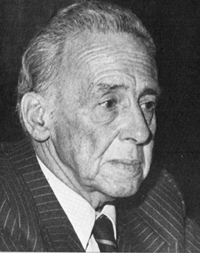
Pierre-François Caillé
A cultivated man of letters who was admired by all, Pierre-François Caillé (1907–1979) enjoyed considerable prestige and immense credibility.2 We owe the dubbing and subtitling of over 300 films to him. Throughout his life, he was an ardent promoter of the global movement to recognize translators and a tireless advocate of their rights. In addition to co-founding the Société française des traducteurs (1947), he founded the International Federation of Translators (1953) and its publication, Babel (1954).***
In 1984, to mark the 30th anniversary of FIT, Caillé’s article was once again published in full in Babel.3 This no doubt reinforced the belief that the quote is Joseph de Maistre’s.
Among the many writers who have reproduced this quote, believing in good faith that it was indeed penned by de Maistre, Henri Van Hoof would definitely be at the top of the list. He cites it in an article that appeared in the journals Babel and Meta4 in 1990 and uses it as the epigraph for his Histoire de la traduction en Occident5 in 1991 and in the foreword to his Dictionnaire universel des traducteurs6 in 1993.
The quote appeared in the Dutch journal Van Taal Tot Taal in December 1990, and Frederick Mostert cited it in Language Today seven years later. In his Souvenirs d’un traducteur,7 Edmond Tupija also attributed it to de Maistre, as did Giovanni Dotoli, in 2003: "Translations [sic] are the draft horses of civilization [translation]."8 The next year, the quote appeared as an epigraph in the Spanish journal Hieronymus Complutensis (No. 11, p. 5).
A translation?
Russian writers usually attribute this quote to Pushkin, but other writers, no doubt influenced by Caillé’s and Van Hoof’s articles, claim that it is a statement made by de Maistre that Pushkin simply translated. One such writer is translator and noted translation historian Yuri Levin, a former leading research scholar at Pushkin House in St. Petersburg, who received an honorary doctorate from the University of Oxford and is a corresponding fellow of the British Academy. His reputation in Russia is comparable to the international renown that Caillé enjoyed in his day. In 1962, in an article that appeared in The Art of Translation (in Russian), Levin claimed that Pushkin’s quote is a "translation" of an "ironic statement" by Joseph de Maistre.9 He thus implies that comparing translators to horses illustrates their inferior status and the tedious nature of their work.
Anatoli Mamonov also attributes the quote to de Maistre in Pushkin in Japan10 (1984), as does Nikolai Garbovsky, Dean of the School of Translation at Moscow State University. In his manual Theory of Translation11 (2004, 2nd ed. 2007), Garbovsky devotes three pages to explaining why he believes it is a translation by Pushkin of the words of de Maistre. Yet his only sources are Van Hoof’s Histoire de la traduction and Levin’s article.
Garbovsky claims that the quote appears in Les soirées de Saint-Pétersbourg, which was published in France the year that de Maistre died. However, this publication does not contain anything remotely resembling the passage "chevaux de trait de la civilisation." He notes that the French word trait could mean "link" or "intermediary" here, concluding that почтовые лошади (meaning chevaux de poste or "post-horses," a term for horses kept at a post station for use by mail carriers or for hire by travellers) would be an acceptable variant of chevaux de trait (p. 141). He therefore thinks that Pushkin produced an accurate translation.
Lastly, in a 2011 article in Moscow State University’s journal,12 one of Garbovsky’s colleagues, Olga Kostikova, also claimed that Pushkin’s quote was a translation of de Maistre’s words.
Joseph de Maistre, translator
None of the writers mentioned above took the trouble to check the original source of the quote. Each and every one of them took it for granted that the quote is Joseph de Maistre’s. However, after combing through the 14 tomes of the Count’s Œuvres complètes (Complete Works)13 and consulting with several specialists,**** we could not confirm this assertion. There is no trace of this quote anywhere in de Maistre’s works.
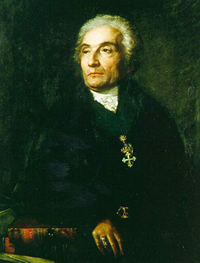
Joseph de Maistre
That being said, de Maistre was not completely unfamiliar with translation. In 1816, he published a French translation of Plutarch’s treatise On the Delay of Divine Justice in the Punishment of the Guilty.14 In his preface, he states with respect to translation that every people has its own philosophical language that is not at all easy to translate into another language (p. 13). His general thoughts on translation are limited to this truism.
Prior to 1955
Before Caillé’s article appeared in Babel, our famous quote was attributed to Pushkin—although it had differing French versions. We’ll come back to that later. In 1886, Viscount Eugène-Melchior de Vogüé (1848–1910) wrote in the foreword to his essay The Russian Novel that Pushkin somewhere (i.e. in an unspecified source) calls translators the "chevaux de renfort de la civilisation"15 (cock-horses of civilization).
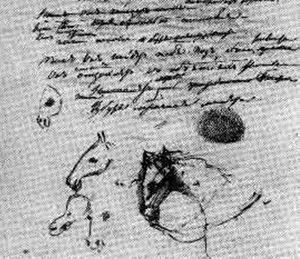
Sketch of horses by Pushkin
In a 1912 issue of the journal Belgique artistique et littéraire, Belgian professor and future academician Albert Counson (1880–1933) wrote that according to a Russian, translators are the "chevaux de relais" (relay horses, meaning post-horses) of civilization.16 There is no doubt that this unnamed Russian was Pushkin.
In a 1949 UNESCO publication, Wladimir Weidlé quotes the man who is said to be "the most French of all the Russian poets," as follows: "‘Translators,’ he [Pushkin] said, ‘are the post-horses of civilization’; and he did not scorn to harness himself, after Zhukovski, to the heavy vehicle of foreign literature."17
Far from being disinterested in translation, Pushkin devoted a great deal of energy to this activity. He translated poems by Chénier, Parny and Voltaire; Alfieri and Ariosto; Mickiewicz; Catullus, Horace and Juvenal; and Byron, Coleridge, Cornwall, Shakespeare and Wilson. He also rendered French translations of Greek poems and Serbian folk songs into Russian. Use of French as a bridge language was a common practice at the time.
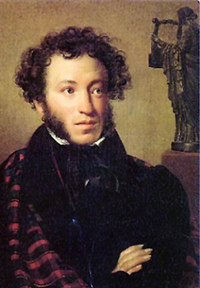
Alexander Pushkin
It is even possible that his use of an intermediary language inspired his post-horse metaphor. Several times during a journey, a traveller would hire a horse at a post station for a section of the trip. Along the same lines, every time a piece of literature is translated into another language, it embarks upon a new stage in its international literary travels, which represents progress for that language’s culture. One can imagine that this is what Pushkin was implying with his metaphor.
The real source: 1830
Those who attribute our famous quote to Pushkin are closer to the truth than those who believe it is Joseph de Maistre’s.
During his analysis of Pushkin’s manuscripts, Ilia Chliapkine found that the poet had written his now-famous quote on a rough draft of the 37th verse of the 8th chapter of Eugene Onegin in September 1830.*****18 We know that translation was on Pushkin’s mind at the time because in the 35th verse he lists several authors whom Onegin was reading in French.19
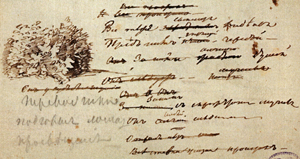
Pushkin’s manuscript (fragment)
Furthermore, Pushkin scrawled his now-famous quote, as you can see in the lower left of the manuscript fragment above,20 when he was writing his short story "The Stationmaster," and entered two lines from his friend Pyotr Vyazemsky’s poem "The Post Station" as the short story’s epigraph. As the poem explains, travellers in Russia often had to wait at stations before obtaining fresh horses. Perhaps with his metaphor Pushkin is also implying that readers must wait a long time before being able to read foreign works in their own language.
Lastly, it should be noted that in January of the same year, Pushkin published two reviews of translations: the Iliad translated by Nikolai Gneditch and Benjamin Constant’s Adolphe, translated by Pyotr Vyazemsky. At the very least one could say that in 1830, translation was often on Pushkin’s mind and certainly inspired his famous quote.
Terminological considerations
You have most likely noticed that the French translations contain variants of the same term: chevaux de trait, chevaux de poste and chevaux de renfort. However, these terms are not synonymous. A cheval de trait (draft horse [US], draught horse [GB]) was a large, strong horse selected for its ability to pull agricultural implements or artillery pieces or to tow boats. A cheval de poste or cheval de relais (post-horse or relay horse) was a fresh horse that travellers hired at post stations. A cheval de renfort (cock-horse) was a horse that was added to a harness at difficult places during a trip. The cock-horse rider provided, mounted, lead and brought back the horse hired by the coachman.
Rendering unto Caesar
It should be recognized that a mistake was made as to the author when Alexander Pushkin’s quote was incorrectly attributed to Joseph de Maistre in 1955 and afterwards. Research indicates that the mistake originated with Babel.
According to the Dictionary of the Language of Pushkin,21 the word просвещение designates an action, "educational instruction," and, at the same time, a state, "civilization or culture." In the French-Russian Dictionary, the word просвещение corresponds to "enlightenment of mind," "civilization," "illumination" and "instruction."22 This explains the number of French variants cited above. For the Œuvres complètes (Complete Works) of Pushkin published in 1958, Jacques Lépissier produced the following translation: "Les traducteurs sont les chevaux de poste de la culture."23
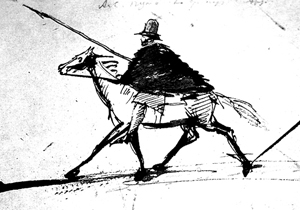
Self-portrait of Pushkin on a horse
The translation website Proz.com provides no less than 40 translations of this quote in as many languages,24 but the source-language version for the other translations, "Translators are the draught horses of civilization," is inaccurate. It should read "post-horses" where it states "draught horses."
Lastly, the misattribution could be due to the fact that Joseph de Maistre spent several years in Russia and was related to Pushkin. In 1803, he travelled to St. Petersburg as ambassador from Victor Emmanuel I, King of Sardinia, and he lived there until 1817.
Be that as it may, far from being unique in the annals of translation, this case reminds us that the utmost care is required when it comes to citations, especially when they are not rigorously referenced. Citing word for word from an original source is a requirement with which all serious writers should comply. In doing so, they render unto Caesar….
Remarks
- * This witticism was quoted by André Chaumeix in his speech on his election to the Académie française on April 30, 1931.
- ** The Russian poet was related to de Maistre. The latter’s brother, Xavier, married Sofia Zagriajskaïa, Pushkin’s wife’s aunt.
- *** He also penned the Translator’s Charter (1963) and a recommendation to the governments of all the member countries of UNESCO to uphold the moral and material rights of translators so as to improve their legal and social status in the world, which was unanimously adopted by the Nineteenth Session of the General Conference of UNESCO, in Nairobi, in 1976.
- **** We would like to thank Richard Lebrun, Carolina Armenteros, Maria Degtiariova, Vera Miltchina and Gennadi Samouilov.
- ***** The researcher noticed that Pushkin had misspelled почтовыя (post-horse), which he had written as подчовыя. In the early editions of Pushkin’s works (from 1855 to 1931), this word was replaced with the synonym подставныя (relay horse).
Notes and references
- 1 "Foreword," Babel, Vol. 1, No. 1, p. 3.
- 2 See In memoriam Pierre-François Caillé (1907–1979), Sofia-Presse, 1981.
- 3 "Trente années. In memoriam Pierre-François Caillé," Babel, Vol. 30, No. 3, pp. 131–141.
- 4 "Traduction biblique et genèse linguistique," Babel, Vol. 36, No. 1, p. 38; Meta, Vol. 35, No. 4, p. 795.
- 5 Duculot, p. 5.
- 6 Slatkine, p. vii.
- 7 L’Harmattan, 2001, p. 234.
- 8 Les traductions de l’italien en français au XVIIIe siècle, BNF, 2003, Vol. 2, p. 7.
- 9 Юрий Левин, "Об историзме в подходе к истории перевода," Мастерствоперевода, 1962–1963, p. 391.
- 10 Анатолий Мамонов, ПушкинвЯпонии, Москва, Наука, 1984, p. 217.
- 11 Николай Гарбовский, Теорияперевода, Москва, МГУ [c. 2004], 2007, p. 142.
- 12 Ольга Костикова, "История перевода: предмет, методология, место в науке о переводе," Вестник МГУ, серия 22, 2011, No. 2, p. 4.
- 13 Vitte and Perrussel, 1884–1886, 14 Vol., Gallica: http://gallica.bnf.fr.
- 14 Lyon, printed by Rusand; Paris, "Mémorial religieux, politique et littéraire," 1816, XVI-212 p.
- 15 E. Plon, Nourrit et Cie, p. LII.
- 16 "La Belgique romano-germanique," Vol. 29, 1912, p. 7.
- 17 Great Anniversaries: Pushkin (1799–1837), UNESCO, 1949, p. 11.
- 18 Илья Шляпкин, Из неизданных бумаг А. С. Пушкина, СПб, 1903, pp. 24–25.
- 19 See the comment by Vladimir Nabokov.
- 20 Александр Пушкин, Болдинские рукописи 1830 года, СПб, Альфарет, 2009, manuscript ПД 166. The statement appears in the lower left.
- 21 Словарь языка Пушкина, Москва, 1956–1961.
- 22 Charles-Philippe Reiff, Dictionnaire russe-français, St. Petersburg, 1835–1836, Vol. 2, p. 817.
- 23 Published under the direction of André Meynieux, André Bonne Éditeur, Vol. 3, 1958, p. 725.
- 24 "Quotation of the day – Verba Volant," http://www.proz.com/forum/literature_poetry/3205-quotation_of_the_day_verba_volant.html.
© Public Services and Procurement Canada, 2025
TERMIUM Plus®, the Government of Canada's terminology and linguistic data bank
Writing tools – Favourite Articles
A product of the Translation Bureau


